Managers' Impact on Your Bottom Line

We’ve all heard the saying “People don’t leave companies—they leave managers” over and over and over again. It’s a cliche because it’s mostly true—and provides an easy way to talk about how important managers are to a company’s culture and an employee’s experience.
But that phrase also understates the importance of good managers to a company’s bottom line because of their impact on retention and engagement. In fact, there’s a wealth of new research showing what a critical role effective management plays—and what’s also getting in their way. Let’s dig in.

A good manager delivers real returns
Managers are a vital link in your organization; holding onto the good ones improves your organization. But managers have an even greater role in organizational turnover, engagement, and performance than we knew—until now.
Managers boost retention rates
New research from Bonusly, in partnership with Lighthouse, shows that having a supportive manager more than doubles employee retention. Having a manager who is just going through the motions, on the other hand, drops the retention rate of employees by more than half. Even having a manager who tries, but is just too busy to be fully supportive, hurts retention rates by more than 25%.
Imagine if you could cut your turnover rate in half—how much money would that save your organization? And how much better would employee morale be as well? Since many companies are currently struggling with employee retention as more than half of employees say they intend to leave their current jobs, this new revelation could help drive a lot of improvement.
Managers drive employee engagement
Managers also have an outsized impact on team and employee engagement. Recent research from Gallup found that a stunning 70% of the variance in team engagement is determined solely by the team’s manager. That’s right: nothing else has as significant of an impact on employee engagement levels as their manager.
With the high ROI of employee engagement on your company’s bottom line (and the estimated $7.8 trillion cost of lost productivity due to disengaged employees), just one manager’s impact can make a huge difference in your company’s productivity and profit.
Organizations that want to increase employee engagement (which should be… all of them 🙃) must focus on supporting manager engagement to get the best results.
Managers create high-performing cultures
Managers are also the secret ingredient in high-performing cultures. By enabling their team’s performance (not just managing it) and providing coaching, motivation, and feedback, they drive high levels of performance that even the best high-level leadership can’t on their own.

What gets in the way of enabling effective management
The data is clear: managers are the key to higher performance and a stronger bottom line. But managers today are struggling: more than half are burned out, according to Microsoft research, and managers facing exhaustion are 1.8 times more likely to leave their company.
Organizations need to develop more effective ways to support and enable managers, so they can support and enable their teams in return.
Here’s what you should be doing to better serve and support your managers.
Lack of training
How do people become managers in the first place? In many companies, they’re individual contributors who are promoted because they’re great at that role, and they’re expected to jump into people management with little or no training. No wonder that only 48% of managers strongly agree that they have the skills needed to be exceptional at their job.
You need to train every new manager on how to hold effective 1:1s, how to give frequent and specific feedback, how to enable performance instead of just managing it, and how to hold difficult conversations with employees, among other vital tasks. Expecting them to know instinctively how to do these complex, challenging things right off the bat is a recipe for failure.
Lack of time
Managers have incredibly full plates post-pandemic. They’re tasked with managing employee mental health, juggling hybrid and remote employees, and dealing with major organizational changes that affect their teams. In fact, 51% of managers told Gallup that restructuring and reorganizing of teams has been a major complication for them post-pandemic.
And while they’re dealing with all of these critical people management tasks, they also aren’t given nearly enough time to truly address them. McKinsey research found that nearly half of managers’ work time is devoted to non-managerial work: almost a third is spent on individual contributor work, and nearly one-fifth is spent on admin tasks.
Without the necessary space in their schedules to coach their direct reports, develop a deeper connection with them, and help them find a sense of mission in their roles, managers can’t help your organization’s engagement levels effectively. Getting that low-value work off their plates is an essential initial step.

Investing in enabling and supporting managers
While the crisis of overworked and burned out managers is very real, it’s also solvable, fortunately. But it requires organizations to take manager engagement and enablement seriously, and to invest in both.
Those investments can help form a “virtuous circle,” where managers who feel their company and leaders support and invest in them have higher levels of engagement. In the Bonusly/Lighthouse report, for example, managers who said their company offered technology that supported their performance on the job were 37% more likely to understand their job expectations and responsibilities, which is a key element of engagement.
On the other hand, the managers who said their company didn’t use modern, helpful tools to support them on the job were almost twice as likely to say the company’s culture prevents them from doing their best work.
Supporting your managers means helping them do what they do best: coaching, enabling, and supporting their people.
Takeaways
Managers are truly the strongest drivers of performance, productivity, and profit at your organization, thanks to their outsized impact on employee retention and engagement rates. Invest in giving them more training, tools, and time accordingly, and you’ll have a much more effective and engaged organization as a whole.








